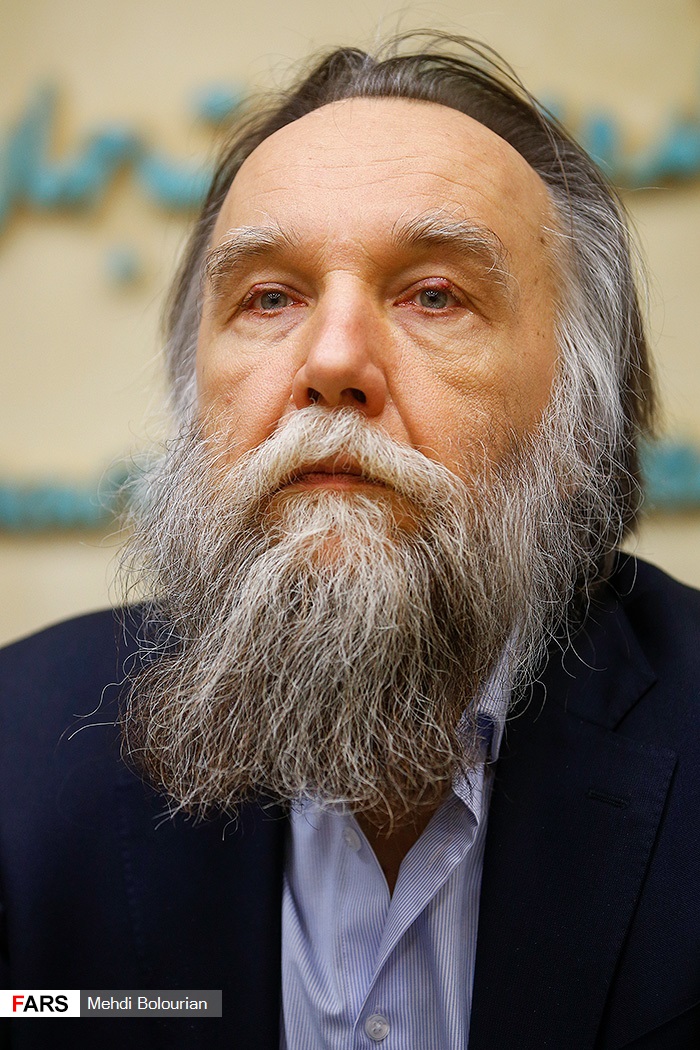
Aleksandr Dugin, at the Civilizations of the Eurasian Area meeting on February 26, 2018 at the Faculty of World Studies, University of Tehran.
A special role in the project is given to Sufism, not only in Turkey but also in other countries in the Middle East and North Africa.
Whatever one thinks of Russian political theorist Aleksandr Dugin’s esoteric cultural-geopolitical theories, his influence in Arabic-speaking countries is worthy of attention. Dugin, a Russian political philosopher who rose to prominence among Russian military and foreign policy elites with the 1997 publication of his book “Foundations of Geopolitics,” has long called for Russia to annex Ukraine to counter “Atlanticist” encroachment. Several of Dugin’s books are available in Arabic translation, most recently a tome published last July by prominent Qatari think tank The Arab Center for Research and Policy Studies. Two elements of Dugin’s ruminations on culture and geopolitics are finding receptive audiences in the Middle East: one, his opposition to U.S. regional involvement; and two, his appeals to cultural conservatism and civilizational identity.
Dugin’s strident critique of U.S. presence in the Middle East has been attractive to members of the Iranian-led “Resistance Axis,” which includes Palestine, Syria, and Lebanon and opposes the “West,” Israel, and Saudi Arabia. Following the assassination of Dugin’s daughter Daria in August 2022 in Russia, allegedly by the Ukrainian government, a top Lebanese Hezbollah official issued a condolence statement that praised Dugin’s support for “the Palestinian cause and the legitimate struggle against American hegemony, Zionist occupation and takfiri terrorism.” Indeed, Dugin’s strong critiques of Israel seemingly appeal to a broad spectrum of the Arab public, including leftists and liberals who may otherwise disagree with many of his far-right-leaning ideas.
Furthermore, Dugin’s cultural conservatism seemingly endears him to a spectrum of Middle Eastern religious movements and organizations, both Sunni and Shi’ite. Perhaps most interesting in this regard are Dugin’s appeals to Sufism, a diverse and varied Sunni school of thought and practice. Broadly speaking, Sufism is associated with a mystical, esoteric approach to Islam, in contrast to the strict textualism of fundamentalist Salafi or Wahhabi groups. The accompanying excerpt from the leftist, pro-Hezbollah Lebanese daily al-Akhbar, translates a 2020 piece written by Daria Dugin on Russia’s approach to the Middle East. In it, she argues for establishing a Russian alliance with the “Islamic Civilization” via Iran and Turkey, with special emphasis on Turkey due to its historical links with Sufism. Dugin’s appeal among Arab intellectuals and pundits has its limits, however. Arab liberals, in particular, are likely to be skeptical of Dugin’s “anti-imperialism” and distrust his appeals to cultural conservatism. As a recent piece in the independent Lebanese news website al-Modon argues, Dugin supports the idea of self-determination yet also “theorizes conquests, profit-sharing, and access to the warm waters of oceans and seas,” and as such is little more than an ideologue seeking to justify Russia’s imperial ambitions.
Sources:
Source: The Arab Center for Research and Policy Studies (prominent Qatari think tank), July 2022. https://bookstore.dohainstitute.org/p-2276.aspx
As part of its “translation series,” The Arab Center for Research and Policy Studies has published a book titled “Geopolitics of Postmodernity: The Age of New Empires, General Outlines of Political Geography in the Twenty-First Century,” by Alexander Dugin.
Source:
“الموسوي: جريمة اغتيال داريا دوغينا تشكل عملاً ارهابياً قذرا
(Al-Moussawi: The assasination of Daria Dugin is a dirty act of terrorism),” al-Manar (Lebanese Hezbollah media outlet), 24 August 2022. https://almanar.com.lb/9887506
Hezbollah’s official in charge of Arab and international relations, Ammar al-Moussawi, issued the following statement:
On the occasion of the tragic incident that claimed the life of Mrs. Daria Dugin, the daughter of the Russian thinker and philosopher Alexander Dugin, I would like to express my condemnation of this crime, which constitutes a filthy terrorist act. I also take this occasion to express my great appreciation for Mr. Dugin’s position and courageous stances in defense of his country and people, as well as of just and righteous causes, including the Palestinian cause and the legitimate struggle against American hegemony, Zionist occupation and takfiri terrorism.
Source:
“روسيا والشرق الأوسط: استراتيجيات آفاق وتوقعات
(Russia and the Middle East: Strategies, Prospects and Expectations),” al-Akhbar (leftist, pro-Hezbollah Lebanese daily), 22 August 2022. https://al-akhbar.com/World/343506
A special role in the project is given to Sufism, not only in Turkey but also in other countries in the Middle East and North Africa, with the exception of countries where Wahhabism, Salafism and Takfirism predominate (Saudi Arabia, the United Arab Emirates and Qatar)… Reviving the traditions of Rumi, Bektashi, and Yunus Emre may also change the role of Ankara, which has a chance to become a true leader of the Sunni world. Sufism, while remaining outside Middle Eastern operations, is at least as mobilizing as Salafism, and could play a role in uniting the Muslim world against Atlanticism and the Wahhabism it supports…
Thus, Moscow, Ankara and Tehran will return to their traditional roots and become centers of three spiritual civilizations (Orthodox, Sunni and Shiite). Together, they will oppose the West. It is interesting to note that these three nations, with imperial traditions, may have fought each other in the past, but today they have learned to overcome historical contradictions and realize the geopolitical inevitability of this tripartite partnership.
Source:
“الدوغينيون العرب
(The Arab Dugins),” al-Modon (independent liberal Lebanese news website), 25 August 2022.
Indeed, in some of his books, Dugin theorizes conquests, profit-sharing, and access to the warm waters of oceans and seas. In short, the Russian Dugin is nothing but the other side of the American ideologues who have exposed us to creative chaos and what resulted from creative chaos, and democracy and what resulted from democracy…
Image Information:
Image: Aleksandr Dugin, at the Civilizations of the Eurasian Area meeting on February 26, 2018 at the Faculty of World Studies, University of Tehran.
Source: https://www.farsnews.ir/photo/13981126000814/نشست-تمدن-های-حوزه-اوراسیا
Attribution: CCA 4.0 INT
